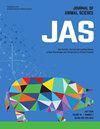Effects of Bacillus subtilis ATCC PTA-122264 on Apparent Total Tract Macronutrient Digestibility and Fecal Characteristics, Metabolites, and Microbiota of Healthy Adult Dogs
IF 2.7
2区 农林科学
Q1 AGRICULTURE, DAIRY & ANIMAL SCIENCE
引用次数: 0
Abstract
Gastrointestinal and stool quality issues are common in companion animals. In addition to dietary fibers and prebiotics, the consumption of live microorganisms may be used to support the gastrointestinal health of pets. Spore-forming Bacillus species are gaining interest due to their viability during processing, storage, and within the gastrointestinal tract. The objective of the current study was to determine the effects of B. subtilis ATCC PTA-122264 supplementation on dietary apparent total tract macronutrient digestibility and the fecal characteristics, metabolites, and microbiota of healthy adult dogs. Twelve healthy adult beagle dogs (6 ± 1.14 yr; 8.71 ± 0.91 kg body weight) were used in a replicated 3x3 Latin square design. Dogs were fed to maintain body weight and allotted to one of three treatments each experimental period (n=12/treatment): Control [kibble diet + placebo (1.25 g of maltodextrin)], Low [kibble diet + 1×109 colony-forming units (CFU)/day of B. subtilis], and High (kibble diet + 5×109 CFU/day of B. subtilis). Each experimental period was composed of a 22-day adaptation phase, 5-day fecal collection phase, and one day for blood collection. Fecal microbiota data were evaluated using QIIME2. All other data were analyzed using the Mixed Models procedure of SAS, with P<0.05 being considered significant. B. subtilis supplementation tended to decrease (P<0.10) apparent total tract dry matter, organic matter, and energy digestibilities, but did not influence food or energy intake, fecal output, and apparent total tract protein or fat digestibilities. Most serum metabolites, hematology, fecal characteristics, and fecal bacterial alpha and beta diversity indices were not affected. Fecal dysbiosis index tended to be affected and fecal Streptococcus, Escherichia coli, and Blautia abundances were lower (P<0.05) in dogs allotted to the Low treatment. These data suggest that daily supplementation of up to 5×109 CFU/day of B. subtilis ATCC PTA-122264 is safe and does not affect markers of general health and fecal characteristics of healthy dogs, warranting further exploration.枯草芽孢杆菌ATCC PTA-122264对健康成年犬全道常量营养物质表观消化率、粪便特征、代谢物和微生物群的影响
胃肠道和粪便质量问题在伴侣动物中很常见。除了膳食纤维和益生元,活微生物的消费可用于支持宠物的胃肠道健康。芽孢杆菌由于其在加工、储存和胃肠道内的生存能力而引起人们的兴趣。本研究的目的是确定添加枯草芽孢杆菌ATCC PTA-122264对健康成年犬饲粮表观全道常量营养物质消化率、粪便特征、代谢物和微生物群的影响。健康成年比格犬12只(6±1.14岁);体重8.71±0.91 kg),采用3 × 3拉丁方重复设计。为了保持体重,在每个试验期间将狗分为三种处理(n=12/组):对照组[粗粉饲粮+安慰剂(1.25 g麦芽糊精)],低[粗粉饲粮+ 1×109枯草芽孢杆菌菌落形成单位(CFU)/天]和高(粗粉饲粮+ 5×109枯草芽孢杆菌菌落形成单位/天)。每一期试验包括22 d的适应期、5 d的粪便收集期和1 d的采血期。使用QIIME2评估粪便微生物群数据。所有其他数据采用SAS的混合模型程序进行分析,以P&;lt;0.05为显著性。添加枯草芽孢杆菌有降低全肠表观干物质、有机物和能量消化率的趋势(P<0.10),但对食物或能量摄入、粪便排出量以及全肠表观蛋白质或脂肪消化率没有影响。大多数血清代谢物、血液学、粪便特征以及粪便细菌α和β多样性指数未受影响。低剂量组更易影响粪便生态失调指数,粪便链球菌、大肠杆菌和蓝菌菌丰度较低(P<0.05)。这些数据表明,每天补充高达5×109 CFU/天的枯草芽孢杆菌ATCC PTA-122264是安全的,不会影响健康犬的一般健康和粪便特征标志物,值得进一步探索。
本文章由计算机程序翻译,如有差异,请以英文原文为准。
求助全文
约1分钟内获得全文
求助全文
来源期刊

Journal of animal science
农林科学-奶制品与动物科学
CiteScore
4.80
自引率
12.10%
发文量
1589
审稿时长
3 months
期刊介绍:
The Journal of Animal Science (JAS) is the premier journal for animal science and serves as the leading source of new knowledge and perspective in this area. JAS publishes more than 500 fully reviewed research articles, invited reviews, technical notes, and letters to the editor each year.
Articles published in JAS encompass a broad range of research topics in animal production and fundamental aspects of genetics, nutrition, physiology, and preparation and utilization of animal products. Articles typically report research with beef cattle, companion animals, goats, horses, pigs, and sheep; however, studies involving other farm animals, aquatic and wildlife species, and laboratory animal species that address fundamental questions related to livestock and companion animal biology will be considered for publication.
 求助内容:
求助内容: 应助结果提醒方式:
应助结果提醒方式:


